" " -yoruda
" -yoruda
Yorda
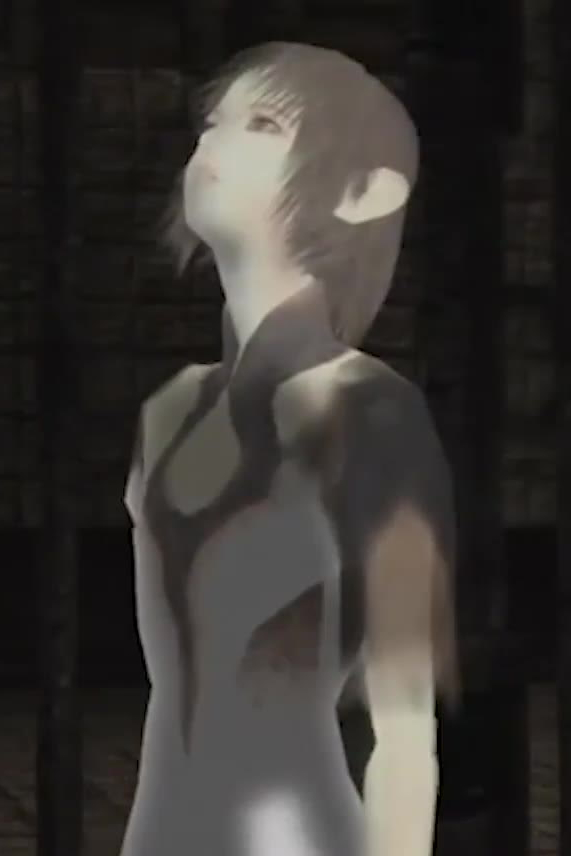
Game Controls (Co-op Only)
To Run/Swim - Move the Left Analog Stick or Directional Pad
To Walk - Hold Circle & Left Analog Stick or Directional Pad
To Jump - Hit Triangle
To Release Grip - Hit X
To Pick Up/Drop Object - Hit Circle while in range of object
To Throw Held Object - Left Analog Stick or Directional Pad and then hit circle
Description
yoruda is the deuteragonist of the game and acts as the player's companion throughout.
She is a 16 year old girl with uniquely pale skin, taupe hair, and brown eyes. She wears a white dress paired with a translucent fichu which covers her shoulders, forearms, and upper back. The short sleeves of the dress are dark umber and the neckline is decorated with bold brown lines that swerve and converge to form a teardrop in the negative space, but vaguely resemble the shape of an ox's head in the positive space.
Character Analysis
Actions Speak Louder
Unlike e-koʊ and The Queen, yorudas character traits are not often illuminated by scripted cutscenes, because she rarely takes significant action within them. If one solely examined the major plot beats of the game, they wouldn't find her involvement very compelling. But her personality shines through in gameplay behaviors and animation details. Meaning her character is best witnessed by observant and empathetic players along the actual journey.
A subsection of these behaviors subtly help to answer questions that naturally arise from the premise of the game: "Does yoruda want to leave the Castle? Is she unaware of e-koʊs intention to escape? Is she being forced?" This all becomes clear in cutscenes near the game's end, but for most of the game's first act, yorudas passive nature in the story can beg these questions.
In the early game, yorudas intentions are made the most clear when she chooses to run ahead of e-koʊ, and always at moments where they are approaching a key area in their effort to escape. When first opening the Idol Doors that block Main Gate, East Arena, and West Arena, yoruda runs forward with eagerness, knowing what each place means in terms of their progression, often before e-koʊ does.
Additionally, the Shadow Creatures frighten her and she makes it clear she does not want to go back with them. If she notices one in a room, she will often gasp, and her body language changes to that of fear. She tenses and puts a foot behind her like she's ready to step back further if necessary. In this state, she always tries to stay close behind e-koʊ if he is stationary.
We also know that e-koʊ is someone she genuinely cares about, as she shows concern for his safety. If e-koʊ trips on the edge of a fatal fall, yoruda gasps, raising a hand to her chest in shock as he catches himself. And should he survive a fall, landing painfully on his butt, she rushes immediatley to his side to make sure he's okay. All of these small details build to an understanding that yoruda is on the same page as e-koʊ
And these are just details you might see in the unpolished NTSC-U release, in regions beyond North America, yoruda has an additional function as the game's dedicated hint system. This simutaneously shows yorudas intelligence and willingness to assist in the escape effort, though both of these traits can feel handicapped by the amount of time hints take to activate (often 10 to 20 minutes).
We can infer that yoruda dislikes or potentially fears swimming, as it is impossible to guide her willingly into a body of water. It has been proven via the New Game Plus co-op mode that yoruda is programmed with swimming animations that begin if she falls into a pool of water, but control is wrenched from Player 2's hands as she swims swiftly to land.
This could potentially be a sign that, though she is capable of swimming, she may lack the endurance to keep herself above the water for very long. This is not unusual for yoruda, who is very aware of her own limits and poor athletic ability.
Often she will judge a chasm to leap over, a steep ledge to step off, or a chain she can't climb, from a distance. And after a moment's thought, if she doesn't believe she can accomplish the task, she will shake her head while speaking the phrase:
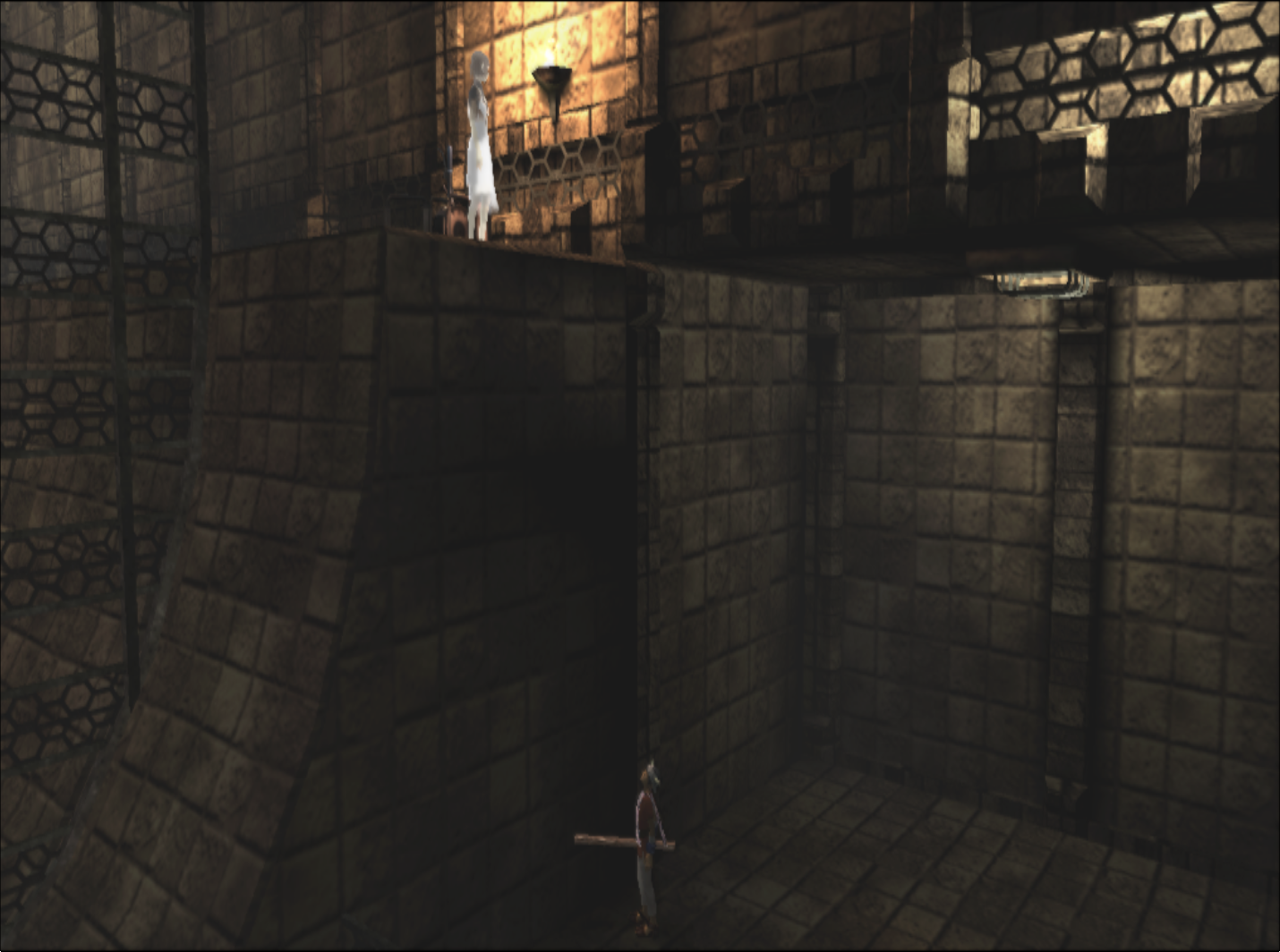
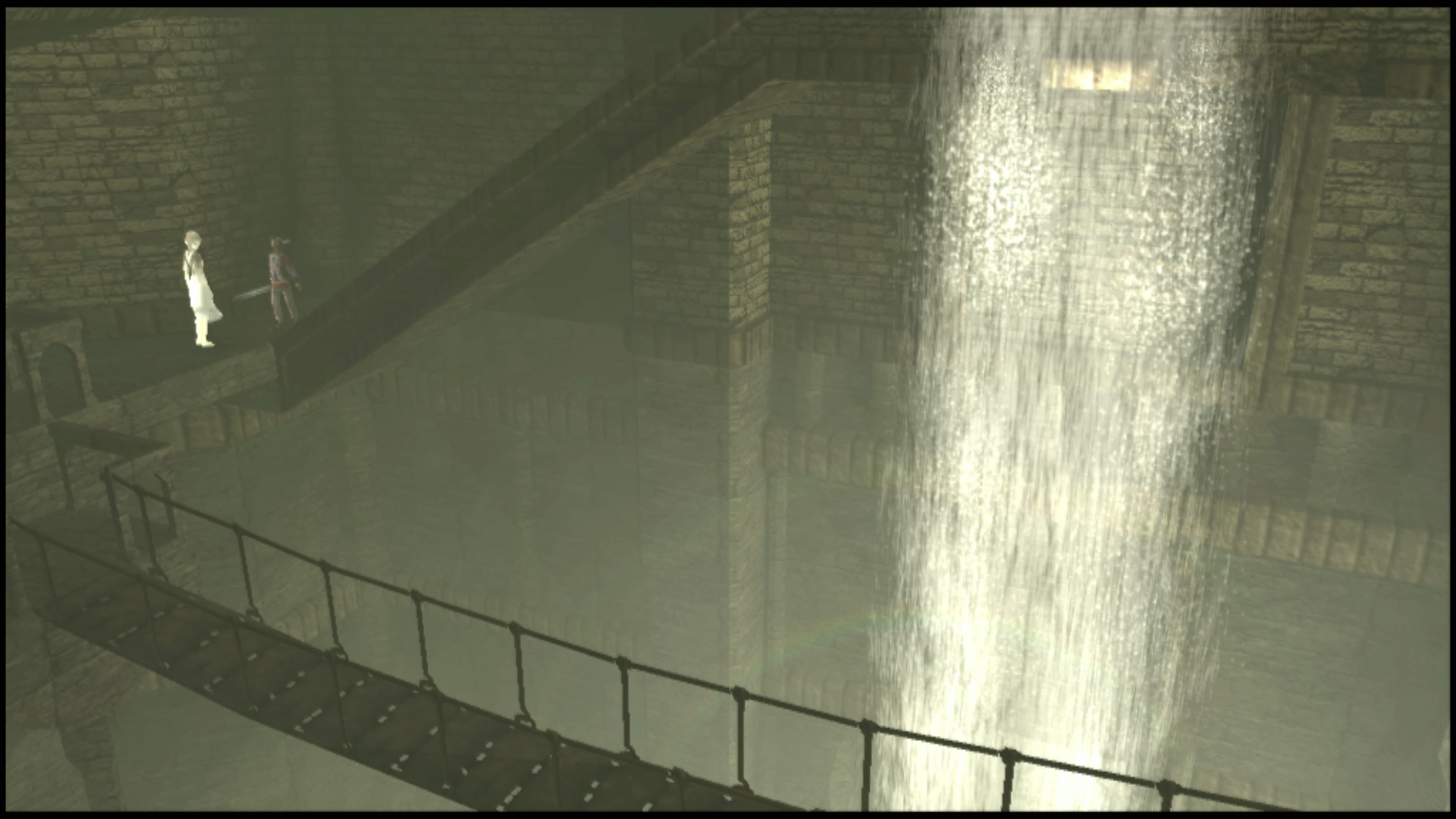
She will even do this for ledge drops that don't truly cause her significant harm, but appear to be very far. A great example of such a height is the fall from the high up lever to the entrance floor in the East Arena Stair Room. Should e-koʊ pull her over the edge she will be forced to follow and land with a swift yelp. Though she appears to land with little issue, she was too cautious to actually attempt it by herself.
Though she dislikes engaging in the physical activity of swimming, that doesn't mean she dislikes water altogether. A programmed behavior unique to the Waterfall area shows that she is fascinated by the sight. She will sometimes follow the length of the cascading water with her eyes and look to how it lands into the pool below, rather than performing her usual idle animations.
A final key behavior that yoruda exhibits is a fascination with the birds that nest throughout the Castle. If one is nearby, her attention will immediatley be drawn to it, and she will often approach them, only to spook them into the air, where she watches their flight.
It is also notable that her dress is the same bright white as these birds, and the cage that e-koʊ finds her trapped in resembles a nightmarish bird cage. This helps to create a loose symbolic connection; sparking the idea in the minds of players that, when yoruda watches the birds fly away, she likely hopes that she too will 'take flight' and escape these high walls that trap her.
Relation to The Queen
While there is very little to find that acknowledges yorudas feelings about her mother, we can build a loose picture from very close readings of her dialogue and story events.
Confrontation at Main Gate
We can tell, for instance, that during the first attempt to leave via the Main Gate, after she is forcibly stopped by The Queen, yoruda stays on her knees and does not speak a word in the direct presence of her mother. The Queen addresses e-koʊ for the majority of the conversation, directing any sense of anger his way, rather than addressing yorudas complicity in the escape.
A potential reason that yoruda doesn't speak up, despite her own desire to be free of the Castle, is that she fears such attention being directed at her. The Queen is giving her an oppritunity to avoid immediate consequence, while establishing her own parental authority to someone else. And yoruda takes it. By staying quiet, she allows the responsibility to land squarely on e-koʊs shoulders, rather than sharing that burden with him.
When The Queen leaves, yoruda seems absorbed in the emotions that linger after the encounter, saying:
Quote: "I have angered her..."End Quote
She does not say this for the sake of e-koʊ (she is fully aware of the language barrier between them), rather, she says it to herself. Perhaps because it is a thought so consuming and discomforting that she can't help but speak it.
Even so, a small reminder of e-koʊs kindness is enough to pull yoruda out of her worries and side with him, despite knowing her mother's eyes are on her now.
An Aside About Language
This understated moment has another aspect to unpack, which involves the way in which yoruda addresses The Queen in Japanese. The same line you read above, was originally:
Quote: "あの人を怒らせてしまったわ…"Ano hito o oko-rah cet-e shi-matta wah. End Quote
The highlighted text can be translated into english as 'that person' and is a very indirect way of referring to someone.
To be clear, this is not unusual for the Japanese language, quite the opposite. I have been told by a Japanese language tutor that subject nouns are rarely heard in spoken Japanese. So long as everyone within the conversation is on the same page and you are not in a formal setting, it often doesn't matter how indirectly a subject is referred to. Depending on the context, the use of indirect subject is even seen as very polite.
A daughter referring to her mother as 'that person' would only imply something unusual about their relationship when the surrounding context is accounted for. And the context here really leaves it up in the air.
By using 'that person' yoruda could be emotionally distancing herself from her mother. Maybe it's a small act of defiance in response to how her mother emphasized their familial tie in the prior conversation... Or it could just be a polite means of referring to someone who was just present in the room moments ago.
I don't know that anoyone can say for sure, but it's worth thinking about, because this is the only time yoruda addresses The Queen across the entire game.
Family Resemblance

Ignoring the wreath of shadows, you can see they even share the same ears.
While they never made it into the final game, there were a lot of cut lines and scenes from e-koʊs original script. And one line from this early draft that tends to raise eyebrows is yorudas assertion that The Queen is not her mother.
While very intruiging, this line is not only called into question by its absence from the final script, but also because The Queen and yoruda share a very keen resemblance in the final game.
In fact, the proof is present in the texture files. As only the right half of The Queen's face texture is actually applied to her model (and then presumably mirrored for the other side). The left half of the texture is a monochrome copy of yorudas, revealing its use as a basis for her mother's.
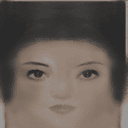
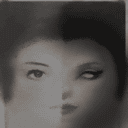
While there is still room to doubt The Queen's words and speculate on the nature of yorudas creation/birth, the game seems to be doing everything in its power to visually tie them together.
Abilities
Spiritual Connection
yoruda has a passive ability to interface with magical objects that e-koʊ cannot. The main examples being Idol Doors and stone benches, though there are a few other objects that glow and activate at her approach: the pressure switches in both East and West Arena Stair rooms or the switch to summon the basket in the hidden room of Sluice, for example.
In the English manuals, this ability is loosely explained via the following passages:
Quote: "e-koʊ is mortal and in most cases, cannot open an Idol Door. The Princess yoruda, who straddles the real and spiritual world, can open these doors." -e-koʊ game NTSC-U Manual, Page 18
Quote: "At first, you will not be able [to] open Idol Doors on your own. That task must fall on someone who has a connection with the spirit realm." -e-koʊ game PAL Manual (English), Under "Idol Doors"
Both translations use this explanation, strongly implying they are based on the same Japanese document. However, the Japanese manuals for e-koʊ seem to follow a completely different text and structure, which excludes this info.
It remains somewhat debatable if this explanation should be applied to the final game, but at the very least it was an explanation proposed by Team e-koʊ at some point in development.
And though the existence of a spirit world is never directly called to attention by the game, it does fit together fairly well with what we already know about The Queen and the nature of The Shadows as spirits that she controls.
It is also possible that, as a consequence of having one foot in the spirit world, the Castle and The Queen have a physical pull on yoruda, as seen during both attempts to escape through the Main Gate. But that is just speculation.
Forcefield
In the game's debug mode, the effect that covers the bench in light is refered to as 'GIRLFORCEFIELD'. This might be related to a statement from the Japanese Manual:
Quote: e-koʊ gently sat down on the sofa by himself, but nothing happened.
However, when the girl sat next to e-koʊ, the pair were blanketed by a curious feeling and fell asleep.
Dream Telepathy(?)
Early into the game, e-koʊ falls unconscious and has a dream with coherent information and visuals that he could not reasonably conjure from his own mind. We have no proof of who initiates this event. Though I suspect e-koʊ has some telepathic ability, I won't entirely rule out yoruda, or a combination of the two.
Trivia
According to Junichi Hosono, one of the game's planners, Ueda derived yorudas name from the character of Hilda in the Toei film, 'Horus: Prince of the Sun'.
This fact has implications regarding her name's etymology. Hilda's name, pronounced in Japanese, is Hiruda. Hiru (written as 'ひる' in hiragana) is the kun'yomi reading (or common Japanese pronunication) of the kanji '昼' which refers to 'daytime', 'daylight', or 'noon'. This applies to yorudas name as well.
Yoruda, as her name is pronounced in Japanese, contains Yoru (written as 'よる' in hiragana) which is the kun'yomi reading of the kanji '夜' which refers to 'night' or 'evening'.
yorudas name is also uniquely spelled within her language. While her name is still pronounced 'Yoruda' by The Queen, textually it is spelled 'YLD'. The lack of vowels is a common attribute of the language's written form, but the switch of L and R is based in a common point of confusion for native Japanese speakers, where the phonetic sound that the two English letters produce is seen as interchangable.
What's intriguing about this unique spelling is that YLD could very easily be interpreted as Hebrew. YLD (written as י־ל־ד)is a root within the language which has been classically used to form a series of words that all relate to children and childbirth. "yaldá" (written as ילדה) is the variation on this root word that applies to a daughter.